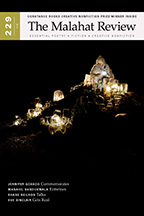Jason Emde,
"You Are Here"
My mother dies, my father is suddenly undone and incomplete, and he decides to come and see me in Japan at last. I propose throwing our feet at the Shikoku eighty-eight temple pilgrimage, 1200 kilometres in a gigantic Buddhist loop around the smallest of the four main Japanese islands, just to see what would happen, what ghosts would swarm us on the path. My father, doleful, heartsick, and amenable, approves. “Sometimes a wind comes out of nowhere,” he says. We begin to prepare.
He arrives in late March, just ahead of the cherry blossoms. We spend a few days shuffling around Gifu, talking and drinking, and then I kiss my sleeping wife on the eye and my father and I hoist our packs and walk to the train station. The morning star flies roaring in the five a.m. blueing above; I wait for it to fly into my mouth. Crows fight in the cool shadows outside the downtown hostess bars and the moon flows over the rest.
“How’re your cosmic vibrations, old man?”
“Can’t feel ’em yet.”
“Don’t you know they neither increase nor decrease? Are neither pure nor impure and comparable Buddhist babble? Don’t you know anything?”
“Not much more than you, insolent son of mine.”
We make it to Tokushima City and start walking the next day.
Shikoku is the least developed, least populated, and least popular of the Japanese islands. Until I read about the pilgrimage I’d never had the slightest urge to visit during my thirteen years in Japan. Even the name is uninviting: Shikoku, which is written with the characters for four and province, is a homonym for death country. There are fighting dogs in Kochi, Sanuki udon noodles in Kagawa, a trashed-out economy, four million people, four prefectures of slowly emptying cities, no volcanoes, and the pilgrimage. Shikoku is authentic nowhere. As many as one hundred fifty thousand Japanese, most of them on bus tours, circle the island every year, visiting the eighty-eight temples and racking up karmic merit. Approximately five thousand walk. At the heart of the pilgrimage is Kobo Daishi, the saint responsible for bringing Shingon Buddhism to Japan from China. Born on Shikoku in 774, enlightened in a cave at Cape Muroto—he wrote the morning star flew into my mouth—he’s entombed among the giant cedars on Mt. Koya, awaiting his return, 56,000,000 years from now, to this messy plane of existence. The monks on Koya still bring him food twice a day. The staff pilgrims carry represents the Daishi, and his presence is invoked at each temple with the phrase namu daishi henjo kongo: Homage to the Universal Adamantine Illuminator.
Printed on the sedge hats and pilgrim vests we buy in the shop attached to the first temple is dogyo ninin: Two people, one practice. My father and me.
On the first day, between temples two and three, my father stumbles on a lip of pavement, wobbles hugely, and topples over in horrible slow motion, his overloaded backpack propelling him earthwards while a stone wall rushes cruelly up, snapping back into place only after he’s crashed with a lot of noise and a few cuts and scrapes but no calamitous damage. I take some of his gear and strap it to my pack.
“Tragedy postponed!” he says.
“Yeah but look at this, first day and you’ve already got me carrying your crap.”
“I was wondering when you’d say that.”
A woman rushes out of a nearby house and gives us cold cans of soda.
Konsen-ji, the Temple of the Golden Well. While my father bows and recites at the Main Hall I sit brooding over the smear of blood on his first-aid pouch. We’ve been fueled by a kind of self-congratulatory anticipation but it’s possible we haven’t thought this thing through. 1200 kilometres. Seven, eight weeks. Mountains. Snakes. My father, sixty-three years old, out of shape and wearing lousy shoes. Strain, damage, mishap, mistake. Bad luck and foolishness. Disarray. Death country.
At each temple we perform with candles and incense and our voices, scaffolding our unbelief with ritual. We bow at each hall, put our name slips in the metal box, throw coins in the wooden one, and murmuringly wrestle with the Heart Sutra.
No aging and death, nor the ending
Of aging and death;
No suffering, no cause, no extinction, no path.
We write wishes on the back of each name slip. I ask for all kinds of things: forgiveness from old girlfriends I treated poorly, for money, for my friends to stop fighting, for my wife’s face, for help getting off the slaving cigarette wheel, for my father not to fall down again. A string of half-hopeful, half-cynical demands.
“Do you change your wishes each time, dad?”
“Nope. Always the same.”









